-
SPEAK OUT!® Individual Treatment and Groups
SPEAK OUT!® is a speech therapy program created by the Parkinson Voice Project, designed to improve voice and speech function of people with Parkinson’s Disease, which in turn helps swallowing function. The key element of the SPEAK OUT!® approach is turning speech from being an automatic activity to one that is intentional. During and following treatment, clients report improvements in their speech, their loudness and ability to be heard by others, and overall quality of life.
The program is usually completed across approximately 12 individual sessions spanning four weeks. Clients are invited to join SPEAK OUT!® groups, which is an ongoing component of the program and meets once a week. SPEAK OUT!® groups provide an opportunity to maintain skills acquired during individual treatment and are a fun, social community for members.
To learn more about the Parkinson Voice Project, visit their website here:
-
When and where can I receive services?
Individual SPEAK OUT!® sessions can be completed with one of our therapists in person or via teletherapy on Zoom. Sessions are usually scheduled weekday mornings with some afternoon availability.
If you would like more information or would like to join a virtual SPEAK OUT!® group, please contact us.
-
I just received a diagnosis of Parkinson's Disease. When should I see a speech therapist?
Approximately 90% of people with Parkinson’s may develop speech difficulty. Aspiration pneumonia due to swallowing issues accounts for an estimated 70% of the mortality rate in this patient population. When people with Parkinson’s lose their speaking abilities, this impacts their ability to effectively converse with family and friends, talk on the phone, and even order food in a restaurant.
Preventive action to postpone and mitigate decline in function is recommended, and speech therapy is optimal to begin as soon as possible. SPEAK OUT!® individual and group treatment programs can have a significant positive impact the disease has on your voice by requiring you to use your muscles for speaking and swallowing to their fullest potential to prevent disuse and weakness from developing.

